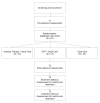Exercise therapy and cognitive behavioural therapy to improve fatigue, daily activity performance and quality of life in postpoliomyelitis syndrome: the protocol of the FACTS-2-PPS trial
- PMID: 20082714
- PMCID: PMC2821386
- DOI: 10.1186/1471-2377-10-8
Exercise therapy and cognitive behavioural therapy to improve fatigue, daily activity performance and quality of life in postpoliomyelitis syndrome: the protocol of the FACTS-2-PPS trial
Abstract
Background: Postpoliomyelitis Syndrome (PPS) is a complex of late onset neuromuscular symptoms with new or increased muscle weakness and muscle fatigability as key symptoms. Main clinical complaints are severe fatigue, deterioration in functional abilities and health related quality of life. Rehabilitation management is the mainstay of treatment. Two different therapeutic interventions may be prescribed (1) exercise therapy or (2) cognitive behavioural therapy (CBT). However, the evidence on the effectiveness of both interventions is limited. The primary aim of the FACTS-2-PPS trial is to study the efficacy of exercise therapy and CBT for reducing fatigue and improving activities and quality of life in patients with PPS. Additionally, the working mechanisms, patients' and therapists' expectations of and experiences with both interventions and cost-effectiveness will be evaluated.
Methods/design: A multi-centre, single-blinded, randomized controlled trial will be conducted. A sample of 81 severely fatigued patients with PPS will be recruited from 3 different university hospitals and their affiliate rehabilitation centres. Patients will be randomized to one of three groups i.e. (1) exercise therapy + usual care, (2) CBT + usual care, (3) usual care. At baseline, immediately post-intervention and at 3- and 6-months follow-up, fatigue, activities, quality of life and secondary outcomes will be assessed. Costs will be based on a cost questionnaire, and statistical analyses on GEE (generalized estimated equations). Analysis will also consider mechanisms of change during therapy. A responsive evaluation will be conducted to monitor the implementation process and to investigate the perspectives of patients and therapists on both interventions.
Discussion: A major strength of the FACTS-2-PPS study is the use of a mixed methods design in which a responsive and economic evaluation runs parallel to the trial. The results of this study will generate new evidence for the rehabilitation treatment of persons with PPS.
Trial registration: Dutch Trial Register NTR1371.
Similar articles
-
Effect of aerobic exercise training and cognitive behavioural therapy on reduction of chronic fatigue in patients with facioscapulohumeral dystrophy: protocol of the FACTS-2-FSHD trial.BMC Neurol. 2010 Jun 30;10:56. doi: 10.1186/1471-2377-10-56. BMC Neurol. 2010. PMID: 20591139 Free PMC article. Clinical Trial.
-
Effects of aerobic exercise therapy and cognitive behavioural therapy on functioning and quality of life in amyotrophic lateral sclerosis: protocol of the FACTS-2-ALS trial.BMC Neurol. 2011 Jun 14;11:70. doi: 10.1186/1471-2377-11-70. BMC Neurol. 2011. PMID: 21672211 Free PMC article. Clinical Trial.
-
No Reduction of Severe Fatigue in Patients With Postpolio Syndrome by Exercise Therapy or Cognitive Behavioral Therapy: Results of an RCT.Neurorehabil Neural Repair. 2016 Jun;30(5):402-10. doi: 10.1177/1545968315600271. Epub 2015 Aug 7. Neurorehabil Neural Repair. 2016. PMID: 26253175 Clinical Trial.
-
Rehabilitation for postpolio sequelae.Aust Fam Physician. 2004 Aug;33(8):621-4. Aust Fam Physician. 2004. PMID: 15373379 Review.
-
Review of the anaesthetic management of patients with post-polio syndrome.Br J Anaesth. 2025 May;134(5):1385-1391. doi: 10.1016/j.bja.2025.02.017. Epub 2025 Mar 20. Br J Anaesth. 2025. PMID: 40118672 Review.
Cited by
-
Interventions for promoting physical activity in people with neuromuscular disease.Cochrane Database Syst Rev. 2021 May 24;5(5):CD013544. doi: 10.1002/14651858.CD013544.pub2. Cochrane Database Syst Rev. 2021. PMID: 34027632 Free PMC article.
-
Reliability of contractile properties of the knee extensor muscles in individuals with post-polio syndrome.PLoS One. 2014 Jul 14;9(7):e101660. doi: 10.1371/journal.pone.0101660. eCollection 2014. PLoS One. 2014. PMID: 25019943 Free PMC article.
-
Treatment for postpolio syndrome.Cochrane Database Syst Rev. 2015 May 18;2015(5):CD007818. doi: 10.1002/14651858.CD007818.pub3. Cochrane Database Syst Rev. 2015. PMID: 25984923 Free PMC article.
-
Protocol of a mixed method, randomized controlled study to assess the efficacy of a psychosocial intervention to reduce fatigue in patients with End-Stage Renal Disease (ESRD).BMC Nephrol. 2016 Jul 8;17(1):73. doi: 10.1186/s12882-016-0277-8. BMC Nephrol. 2016. PMID: 27391406 Free PMC article. Clinical Trial.
-
Post-polio Syndrome: More Than Just a Lower Motor Neuron Disease.Front Neurol. 2019 Jul 16;10:773. doi: 10.3389/fneur.2019.00773. eCollection 2019. Front Neurol. 2019. PMID: 31379723 Free PMC article. Review.
References
-
- March of Dimes Birth Defects Foundation. Identifying Best Practices in Diagnosis & Care. March of Dimes International Conference on Post-Polio Syndrome; Warm Springs, GA. 2000.
-
- Farbu E, Gilhus NE, Barnes MP, Borg K, de Visser M, Driessen A, Howard R, Nollet F, Opara J, Stalberg E. EFNS guideline on diagnosis and management of post-polio syndrome. Report of an EFNS task force. European Journal of Neurology. 2006;13:795–801. doi: 10.1111/j.1468-1331.2006.01385.x. - DOI - PubMed
-
- Ivanyi B, Nollet F, Redekop WK, de Haan R, Wohlgemuht M, Van Wijngaarden JK, Visser Md. Late onset polio sequelae: Disabilities and handicaps in a population- based cohort of the 1956 poliomyelitis outbreak in the Netherlands. Archives of Physical Medicine and Rehabilitation. 1999;80:687–690. doi: 10.1016/S0003-9993(99)90173-9. - DOI - PubMed
-
- Post-Polio Syndrome Fact Sheet. http://www.polioeradication.org/content/publications/PostPolioSyndrom.pdf
-
- Agre JC, Rodriquez AA, Sperling KB. Symptoms and clinical impressions of patients seen in a postpolio clinic. Archives of Physical Medicine & Rehabilitation. 1989;70:367–370. - PubMed
Publication types
MeSH terms
LinkOut - more resources
Full Text Sources
Medical


